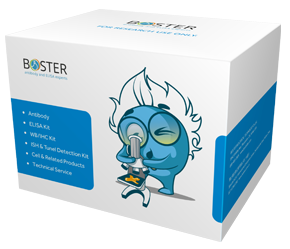Product Info Summary
| SKU: | A05367 |
|---|---|
| Size: | 100ul |
| Reactive Species: | Human, Mouse, Rat |
| Host: | Rabbit |
| Application: | ELISA, IHC, WB |
Customers Who Bought This Also Bought
Product info
Product Name
Anti-KCNT1 Antibody
SKU/Catalog Number
A05367
Size
100ul
Form
Liquid
Description
Boster Bio Anti-KCNT1 Antibody catalog # A05367. Tested in ELISA, IHC, WB applications. This antibody reacts with Human, Mouse, Rat.
Storage & Handling
Store at -20°C for one year. For short term storage and frequent use, store at 4°C for up to one month. Avoid repeated freeze-thaw cycles.
Cite This Product
Anti-KCNT1 Antibody (Boster Biological Technology, Pleasanton CA, USA, Catalog # A05367)
Host
Rabbit
Contents
Liquid in PBS containing 50% glycerol, 0.5% BSA and 0.02% sodium azide.
Clonality
Polyclonal
Isotype
IgG
Immunogen
The antiserum was produced against synthesized peptide derived from human KCNT1. AA range:1019-1068
*Blocking peptide can be purchased. Costs vary based on immunogen length. Contact us for pricing.
Reactive Species
A05367 is reactive to KCNT1 in Human, Mouse, Rat
Reconstitution
Observed Molecular Weight
111 kDa
Calculated molecular weight
138343 MW
Antibody Validation
Boster validates all antibodies on WB, IHC, ICC, Immunofluorescence, and ELISA with known positive control and negative samples to ensure specificity and high affinity, including thorough antibody incubations.
Application & Images
Applications
A05367 is guaranteed for ELISA, IHC, WB Boster Guarantee
Assay Dilutions Recommendation
The recommendations below provide a starting point for assay optimization. The actual working concentration varies and should be decided by the user.
WB 1:500-1:2000
IHC 1:100-1:300
ELISA 1:10000
Validation Images & Assay Conditions
There are currently no images for this product. We are working on uploading them please check back shortly or contact us to expedite our upload process for this antibody.
Protein Target Info & Infographic
Gene/Protein Information For KCNT1 (Source: Uniprot.org, NCBI)
Gene Name
KCNT1
Full Name
Potassium channel subfamily T member 1
Weight
138343 MW
Superfamily
potassium channel family
Alternative Names
Potassium channel subfamily T member 1;KCa4.1;KCNT1;KIAA1422; KCNT1 DEE14, EIEE14, ENFL5, KCa4.1, SLACK, Slo2.2, bA100C15.2 potassium sodium-activated channel subfamily T member 1 potassium channel subfamily T member 1|Sequence like a calcium-activated K+ channel|potassium channel, sodium activated subfamily T, member 1|potassium channel, subfamily T, member 1
*If product is indicated to react with multiple species, protein info is based on the gene entry specified above in "Species".For more info on KCNT1, check out the KCNT1 Infographic

We have 30,000+ of these available, one for each gene! Check them out.
In this infographic, you will see the following information for KCNT1: database IDs, superfamily, protein function, synonyms, molecular weight, chromosomal locations, tissues of expression, subcellular locations, post-translational modifications, and related diseases, research areas & pathways. If you want to see more information included, or would like to contribute to it and be acknowledged, please contact [email protected].
Specific Publications For Anti-KCNT1 Antibody (A05367)
Hello CJ!
No publications found for A05367
*Do you have publications using this product? Share with us and receive a reward. Ask us for more details.
Recommended Resources
Here are featured tools and databases that you might find useful.
- Boster's Pathways Library
- Protein Databases
- Bioscience Research Protocol Resources
- Data Processing & Analysis Software
- Photo Editing Software
- Scientific Literature Resources
- Research Paper Management Tools
- Molecular Biology Software
- Primer Design Tools
- Bioinformatics Tools
- Phylogenetic Tree Analysis
Customer Reviews
Have you used Anti-KCNT1 Antibody?
Submit a review and receive an Amazon gift card.
- $30 for a review with an image
0 Reviews For Anti-KCNT1 Antibody
Customer Q&As
Have a question?
Find answers in Q&As, reviews.
Can't find your answer?
Submit your question





